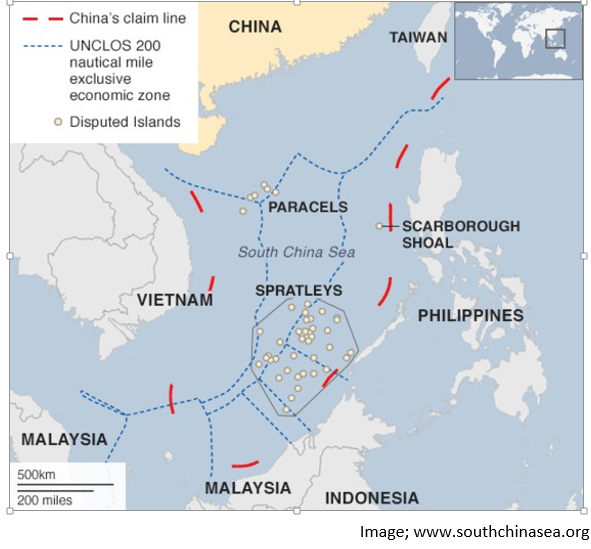Russia has sold or is selling S-300 air defense systems to Iran.
Iran has at least five bases on the Strait of Hormuz. The bases are located at Bandar Abbas, Bandar Lengeh, Sirik, Kish Island and Abu Musa, the latter two being islands.
The Americans have several air bases near or in the Strait of Hormuz in the Persian Gulf. The bases are called Isa Airbase (Bahrain), Al Udeid (Qatar) and Al Minhad and Al Dhafra (UAE).
In addition, the Americans have a naval base in Bahrain, and one on Diego Garcia in the Indian Ocean, and a base in Djibouti on the Horn of Africa. They also have a large base with combat personnel on the British island of Ascension 2,500 km west of Africa halfway to Brazil in South America.
According to Russian President Vladimir Putin, the sale of the S-300 air defense system will stabilize the situation in the Middle East. But more likely it will do just the opposite, destabilizing the situation in the Middle East. Israel felt an urge to take action against Iranian nuclear facilities in the near future before Iran had deployed air defense systems. The Iranian news organization Tasnim reported on July 19, 2016 that Iran had obtained the first S-300 PMU-2 air defense systems which Russia sold to them.
If Israel does not strike while they can, if Iran becomes a nuclear weapons country with operational nuclear weapons with sufficient range and accuracy, then because of the Iranian mullahs’ unpredictability, it could turn into a disaster for Israel, or at least develop into a cold war between Israel and Iran. The Iranians have not been late in involving other stakeholders in the conflict, such as Hezbollah in Lebanon, which risks tipping over the balance of power to Israel’s disadvantage and strengthen Iran’s position in the region. That would probably lead to a new Arab war against Israel. It could also mean that more states in the region would try to develop nuclear weapons.
Nor is there anything to guarantee that Russia will not sell the nuclear weapons carrier missiles to Iran, once Iran has received and deployed its air defense systems. Russian Defense Minister Sergei Lavrov emphasizes that the weapons are defensive and pose no threat to neighboring countries, including Israel. Israeli intelligence minister Yuval Steinitz made a statement; “Instead of demanding that Iran cease its terrorist acts in the Middle East and the world, it now allows the country to acquire advanced weapons that will only lead to increased aggression.”
Iran also supplies crude oil to Russia in exchange for grain and building materials. In this way, we are already being affected in our part of the world as Russia exports its surplus of oil to strengthen its economy. The so-called P5 + 1 group, consisting of the United States, Britain, France, Russia, China and Germany, reached an agreement in July 2015 on Iran’s nuclear program, which meant that Russia and Iran stood as winners. President Putin said in a statement on the Kremlin’s website that the world could take a relieved breath. In Israel, the sentiments were of another kind. The country’s Prime Minister Netanyahu did not mince words and called the agreement a big mistake of historical proportions. The sanctions against Iran were supposed to be lifted. The agreement meant that;
A) Iran would scale down its nuclear program while opening the doors for UN inspectors to all its nuclear facilities, including military ones.
B) The arms embargo against Iran was stated to remain for five years.
C) In addition, according to the IAEA, a roadmap had been signed to investigate Iran’s previous nuclear activities.
D) But even if a contract was in the clear, it would take months before it could take effect. The US Congress and Iran’s parliament would now approve the agreement.
E) The West’s sanctions against Iran, which isolated the country financially, could be lifted and several billion dollars of Iran’s frozen assets thawed thereafter.
Whether or not the sanctions under Obama really were lifted is an assessment question for anyone to figure out for himself.
Source; Euromaidan Press, April 2015; SR; Ekot, July 2015
Homework:
Do you think that Hezbollah with Iran’s help can tip the balance in the Middle East? And if they do, will there be another “Yom Kippur”? If you don’t know what Yom Kippur is I suggest that you read up about it. But I can tell you that it was the Arab war against the Israelis in October 1973 and it is also a Jewish Holiday, which they named the war after since the Arabs attacked Israel on the last day of the yearly Jewish fasting. The Jews were taken by surprise back then in the year of 1973.
Roger M. Klang, defense political spokesman for the Christian Values Party (Kristna Värdepartiet) in Sweden


